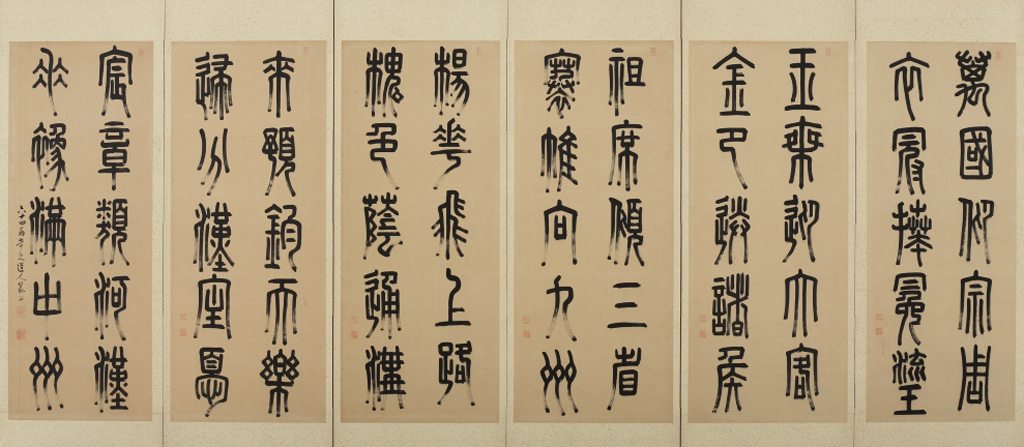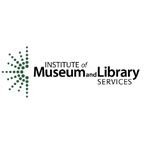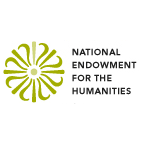Tang Poetry in Seal Script

Morimoto Itsuzan, Tang Poetry in Seal Script, 1765, pair of 6-panel screens; ink on paper, Gift of Mary and Cheney Cowles, public domain, 2011.130.2a,b

This work is not currently on view.
- Title
Tang Poetry in Seal Script
- Related Titles
display title: Written on Command in Response to the Imperially Composed Poem, “Crossing Pujin Pass Early in the Day,” by Zhang Jiuling
display title: Written on Command in Response to the Imperially Composed Poem, “In Late Spring, Seeing Off the Court Officials as they Return to their Districts,” by Wang Wei
original language: 奉和聖製早渡蒲津關
original language: 奉和聖製暮春送朝集使歸郡應制
original language: 書
- Artist
- Date
1765
- Medium
pair of 6-panel screens; ink on paper
- Dimensions (H x W x D)
A and B overall: 64 in x 24 3/4 in; image: 51 3/4 in x 22 in
- Inscriptions & Markings
signature: 六十四翁常足道人, brushed, panel 6 of each screen Translation: Jōsoku Dōjin, at age 64 Language: Japanese
- Collection Area
Asian Art
- Category
Calligraphy
- Object Type
folding screen
- Culture
Japanese
- Credit Line
Gift of Mary and Cheney Cowles
- Accession Number
2011.130.2a,b
- Copyright
public domain
- Terms
Morimoto Itsuzan was part of a circle of Sinophile intellectuals in eighteenth-century Kyoto. He became a master of seal script, an archaic form of writing that originally flourished in China in the first millennium BCE. In this pair of screens, brushed when the artist was 64 years old, he quotes two poems written on command to themes established by the emperor during the Tang dynasty (618–907). The poem transcriptions and translations are by Jonathan Chaves.
A. 奉和聖製早渡蒲津關 Written on Command in Response to the Imperially Composed Poem, “Crossing Pujin Pass Early in the Day,” by Zhang Jiuling
Zhang Jiuling 張九齡 (678–740) was the most important writer and statesman at the Tang court in the 730s, a halcyon period in Emperor Xuanzong’s reign (712–756). The emperor had visited Pujin Pass, a place of historical and strategic importance near the capital city of Chang’an (modern Xian). He wrote a poem on the subject himself and then commanded his courtiers to compose verses on the same theme.
Panels 1–2 (from right to left): 高 長 軒 魏 掌 堤 黃 武 曙 春 問 中 雲 樹 道 流 開 發 迴 處
The place where Emperor Wei-wu stood firm against the flood, The place where the Yellow Emperor turned back, after learning of the Tao! Long embankment, spring trees bursting into bloom, Place split wide open, sun rising through the clouds!
Panels 3–4 天 河 人 龍 杖 津 占 負 役 會 仙 王 風 日 氣 舟 雷 月 來 渡
Dragons here have carried the imperial barge across; Men have come to prognosticate the aura of immortality. River fords join with sun and moon, Heavenly regalia are marshalled before the wind and thunder.
Panels 5–6 元 還 西 東 首 聞 馳 顧 詠 股 萬 重 康 肱 國 關 哉 郡 陪 盡
Gazing east, the layered passes end; Galloping west, 10,000 lands pay tribute! Yes, we have heard tell of this Region of Vital Limbs: Our ruler now sings of prosperity!
B. 奉和聖製暮春送朝集使歸郡應制 Written on Command in Response to the Imperially Composed Poem, “In Late Spring, Seeing Off the Court Officials as they Return to their Districts,” by Wang Wei
Wang Wei 王維 (701-761) is known to history as one of the greatest poets and painters in Chinese history. He first won fame at the royal court through his poetry and skill at music. He rose rapidly through the ranks of government service, in part thanks to sponsorship by Zhang Jiuling—the author of the other poem in these screens.
The poem quoted here, written in the early 730s, likens Emperor Xuanzong to revered ancient rulers of the Zhou and Han dynasties.
Panels 1–2 (from right to left): 金 玉 衣 萬 節 乘 冠 國 送 迎 拜 仰 諸 大 冕 宗 侯 客 旒 周
All lands gaze up in reverence to Zhou! Robes and caps bow down, cap-gems dangling free. The Jade Conveyance welcomes distinguished guests; With golden emblems the feudal lords are seen off.
Panels 3–4: 槐 楊 搴 祖 色 花 帷 席 蔭 飛 向 傾 通 上 九 三 溝 路 州 省
Ancestral holders of seats in the Threefold Secretariat Pour out through raised curtains, leave for the Nine Regions. Willow catkins flutter more









